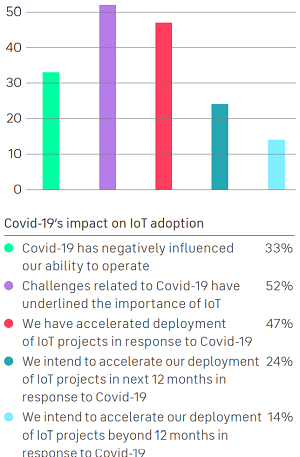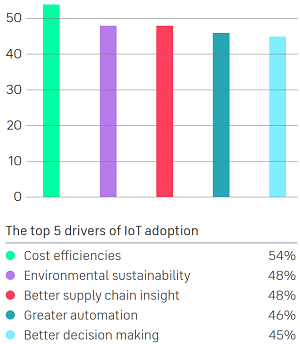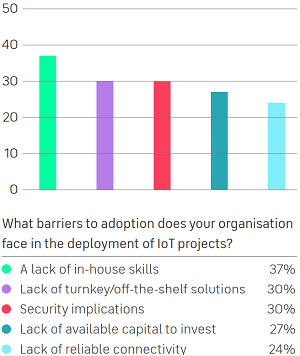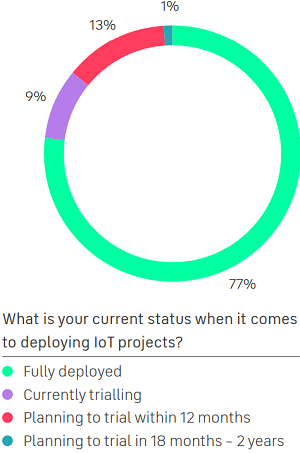News
Will IoT Investment Soon Surpass Cloud Computing?
Satellite communications specialist Inmarsat predicts Internet of Things (IoT) investment will soon overtake digital transformation technologies like Big Data, robotics and next-gen security -- and even cloud computing itself.
That prediction is based on a new research report titled "Industrial IoT in the time of COVID-19." The data backing the prediction comes from interviews with 450 respondents from organizations with at least 250 employees across the agriculture, electrical utilities, mining, oil and gas and transport and logistics sectors in early 2021. Respondents drawn from those multiple industries reported plans to invest the largest proportion of their IT budgets on IoT projects over the next three years, usurping cloud computing from its position as the most invested in technology during the last three years. Other digital technologies competing for IT budget investments include big data analytics, next-gen security, robotics and machine learning.
As with everything these days, the findings are influenced by the pandemic, as reflected in the report's title.
"A year on and parts of the world economy have returned to something like pre-Covid levels, though this period will serve as a stark illustration of why business continuity planning and the digital technologies that underpin it are so critical," the report says. "Those organizations that have come through this period best are those that have embraced digitalization, accelerated their adoption of Industry 4.0 technologies and adapted their business models to give themselves the best chance of weathering the next twist of fate."
The "Industry 4.0" term refers to what has also been called the "Fourth Industrial Revolution," described by Wikipedia as "the ongoing automation of traditional manufacturing and industrial practices, using modern smart technology."
While COVID-19 figures prominently in the report, with some 33 percent of respondents saying it has negatively influenced their ability to operate, some respondents reported a positive impact -- at least for IoT vendors.
"An interesting result of the Covid-19 pandemic has been to supercharge the adoption of IoT, with much of the IoT adoption occurring since the start of the pandemic in 2020, and many organizations stating they have accelerated their IoT projects in response to COVID-19," the report says. "This can be attributed to IoT's remote monitoring and control capabilities, which enable operational continuity even while the movement of people is reduced. Those companies that have already accelerated their IoT deployments or who have IoT strategies are demonstrating greater levels of business continuity and the ability to weather the Covid-storm."
 [Click on image for larger view.] COVID-19's Impact on IoT Adoption (source: Inmarsat).
[Click on image for larger view.] COVID-19's Impact on IoT Adoption (source: Inmarsat).
As far as what's driving that adoption, the No. 1 response was "cost efficiencies," reported by 54 percent of respondents. Other drivers including environmental sustainability, better supply chain insight, greater automation and better decision making were all grouped lower down in the 45-48 percent range.
 [Click on image for larger view.] The Top 5 Drivers of IoT Adoption (source: Inmarsat).
[Click on image for larger view.] The Top 5 Drivers of IoT Adoption (source: Inmarsat).
And then there are the barriers to adoption. Like many other surveys on all aspects of IT, from cloud computing skills in general to niche skills like Kubernetes, the No. 1 answer -- yet again -- is "a lack of in-house skills." That's what was reported by 37 percent of respondents, followed by: lack of turnkey/off-the-shelf solutions (30 percent); security implications (30 percent); lack of available capital to invest (27 percent); and lack of reliable connectivity (24 percent).
 [Click on image for larger view.] The Top Barriers to IoT Adoption (source: Inmarsat).
[Click on image for larger view.] The Top Barriers to IoT Adoption (source: Inmarsat).
"In terms of required skillsets, cyber-security talent is number one, closely followed by a need for additional staff with experience and skills in data science and analytics, technical support and connectivity technologies," the report says. "Additionally, a significant number of respondents still have a need for skills to drive the strategic development, management and procurement of IoT. Without all of these skillsets in place, businesses will continue to struggle to make the best use of the data they gather, to integrate IoT projects into the wider organization and benefit from the transformative role that IoT can play in the global supply chain. If organizations do not have the resources to plug these gaps internally, they must look to external partners to provide the necessary skills."
Other key takeaways from the report are summarized thusly:
Deployment: Some 77 percent of respondents reported they have fully deployed at least one IoT project.
 [Click on image for larger view.] Current Deployment Status (source: Inmarsat).
[Click on image for larger view.] Current Deployment Status (source: Inmarsat).
- Connectivity: Connectivity continues to challenge respondents with 75 per cent per cent of respondents struggling to deploy their IoT projects because of connectivity issues. Respondents are most likely to rank reliability, security and network coverage as their preferred connectivity attributes.
- Data sharing and analysis: Actionable business insights, developed from IoT data, are improving the way businesses and their supply chain partners operate. While 80 per cent of respondents' businesses currently only share data within the organization, many plan to share IoT data with their wider supply chain in the future.
- Supply chains: The world's production and supply chains are becoming increasingly interconnected and digitalized to increase efficiencies and overcome challenges such as climate change, feeding a growing population and supporting sustainable and ethical industry.
- Security challenges: Security challenges associated with IoT projects are a concern for many. In terms of the threats posed, 50 per cent of respondents cited the risk of external cyber-attacks. Although 48 per cent have already responded to IoT security issues by creating an internal IoT security policy to mitigate these threats.
The report comes in the fifth year of the Inmarsat Research Program. The survey was conducted by Vanson Bourne. The report can be downloaded as a PDF for free upon providing registration information.
About the Author
David Ramel is an editor and writer at Converge 360.